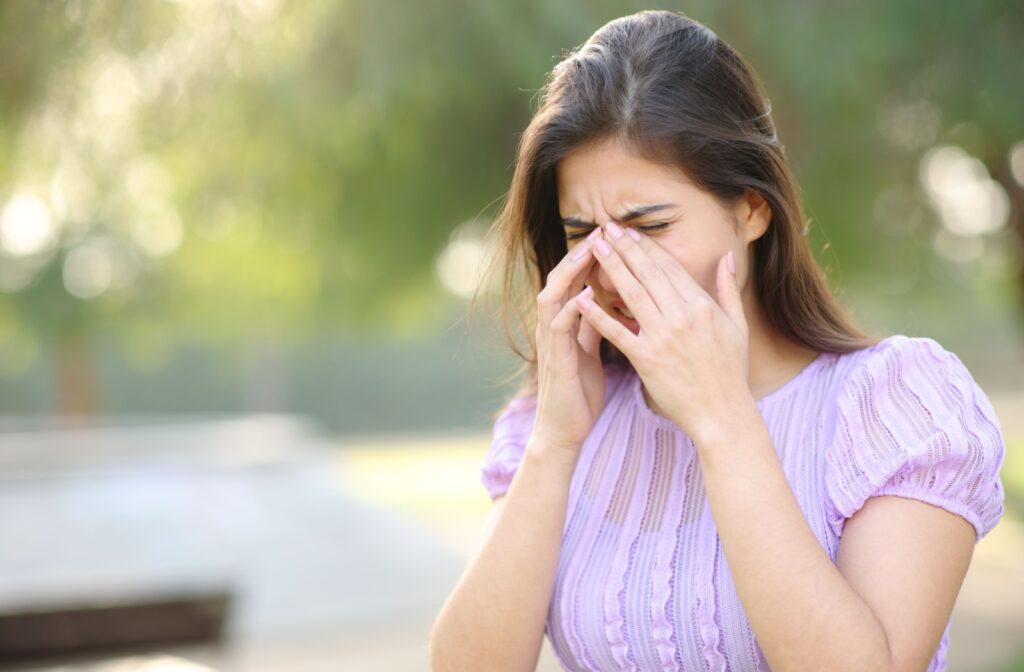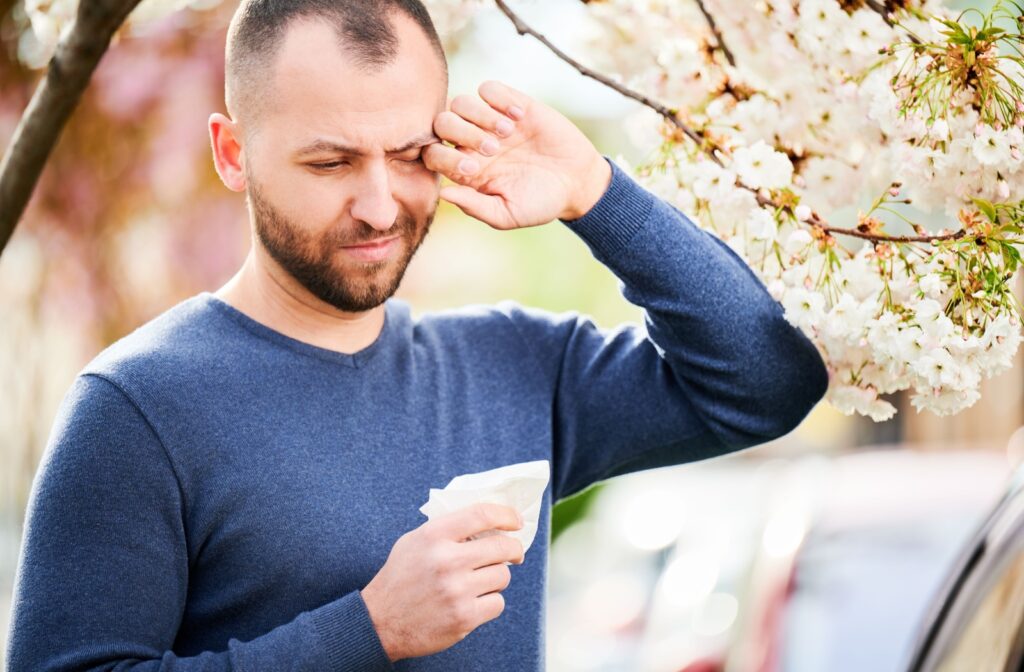As spring fades into summer, blooming flowers and greener landscapes make outdoor life more vibrant, but for allergy sufferers, this beauty often comes at a cost. Along with sneezing and congestion, you might notice your eyes feeling irritated, dry, or gritty. Seasonal allergies can contribute to or worsen dry eye symptoms by triggering inflammation that disrupts tear production and stability.
If you’ve been rubbing your itchy, watery eyes and wondering why they still feel dry, read on. This blog breaks down the link between allergies and dry eyes and offers 7 practical tips for keeping your eyes comfortable through allergy season.
How Do Allergies Affect Your Eyes?
When your body encounters allergens like pollen, dust mites, or pet dander, your immune system reacts by releasing histamines. These chemicals cause inflammation, which leads to itchy, red, or watery eyes. While this reaction is designed to protect you, the inflammation it causes can interfere with your eye’s tear film, the thin layer that keeps your eyes moist and protected.
This disruption can lead to:
- Reduced tear production
- Faster tear evaporation
- Increased eye sensitivity and dryness
If you already live with dry eye disease, allergies can amplify your symptoms, making it harder to find relief without targeted care.
Signs of Allergy-Related Dry Eye
Since allergy symptoms and dry eye symptoms often overlap, it can be tough to know what’s really going on. Here are common signs that your dry eye might be triggered or worsened by seasonal allergies:
- Burning, stinging, or gritty sensations
- Redness and eye fatigue
- Excessive tearing followed by periods of dryness
- Light sensitivity
- Feeling like something is stuck in your eye
Paying attention to symptom patterns can help you and your eye care provider pinpoint the cause.
Can Antihistamines Make Dry Eye Worse?
Many people reach for antihistamines to manage allergy symptoms. While these medications can relieve sneezing and itching, they often come with an unwanted side effect: dry eyes.
Antihistamines reduce tear production, which can exacerbate dryness, especially if you’re taking them daily. If you’re managing allergies and dry eye at the same time, talk to your eye doctor about switching to:
- Allergy eye drops designed for sensitive eyes
- Preservative-free artificial tears for added moisture
- Alternative medications that don’t dehydrate the tear film
7 Tips for Managing Dry Eye During Allergy Season
Whether your symptoms are mild or severe, these tips can help reduce discomfort and protect your eye health:
1. Limit Outdoor Exposure
Try to stay indoors during those high pollen hours (usually early morning and evening). Use sunglasses when outdoors to shield your eyes from allergens.
2. Shower & Change Clothes After Being Outside
Pollen can cling to your hair, skin, and clothing. Rinsing off and switching clothes can reduce exposure. This simple step can prevent allergens from transferring to your pillow, furniture, or eyes.
3. Use a Cold Compress
Applying a cold compress to your eyes can ease inflammation, reduce itchiness, and provide temporary relief.
4. Avoid Rubbing Your Eyes
It’s tempting, but rubbing can often worsen inflammation and damage the surface of your eyes. Instead, use artificial tears to flush out allergens. Frequent rubbing can also increase your risk of developing long-term irritation or even infection.
5. Run an Air Purifier Indoors
High-efficiency air filters can reduce airborne allergens in your home, especially in bedrooms where you spend the most time.
6. Switch to Preservative-Free Eye Drops
Artificial tears help maintain eye moisture, and preservative-free formulas reduce the risk of irritation with frequent use.
7. Schedule a Dry Eye Evaluation
If over-the-counter options aren’t working, a professional exam can identify the root cause and guide your treatment options.

Advanced Treatments for Allergy-Related Dry Eye
When symptoms persist or worsen, modern dry eye therapies can provide long-term relief. These treatments are tailored to your specific needs and can include:
- Artificial tears
- Topical medications
- Heat masks
- Scleral lenses
- Eyelid cleansing wips
Take Control of Your Dry Eye This Allergy Season
You don’t have to suffer through allergy season with itchy, dry, irritated eyes. With the right combination of at-home care and professional treatment, lasting relief is possible.
At Total Vision Pleasanton, we offer advanced diagnostics and personalized dry eye therapies to help you feel comfortable in every season. Schedule a consultation today to find the relief you deserve and see the difference expert eye care can make.



